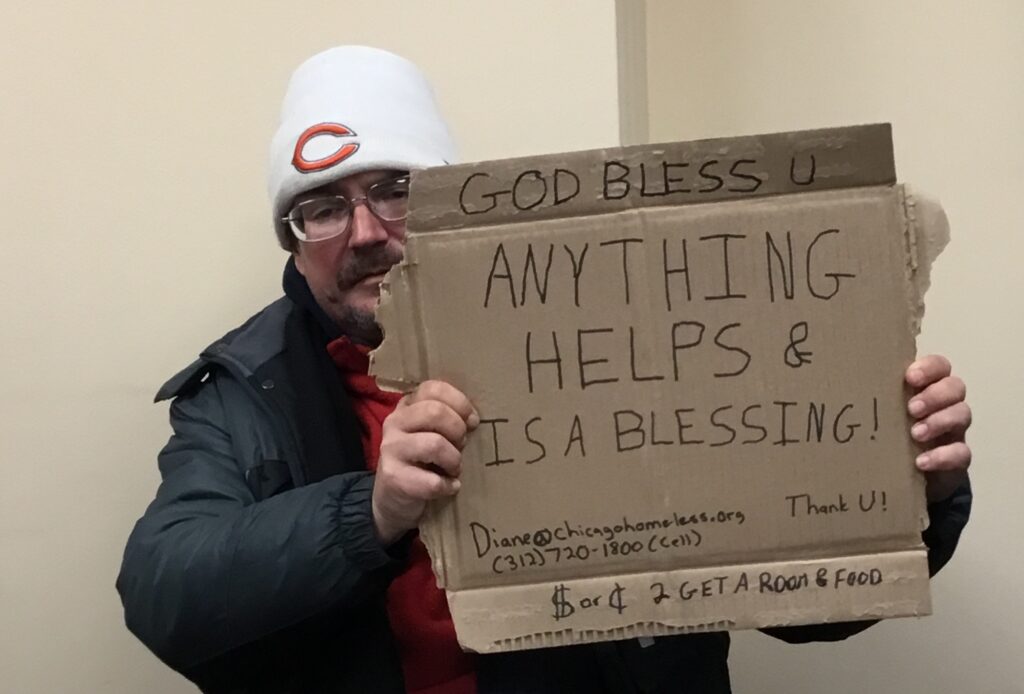FOR IMMEDIATE RELEASE
A federal district court judge in Chicago struck down a state law prohibiting panhandling in public streets and medians and ordered Illinois State Police not to enforce it. The ruling ends a lawsuit by two men experiencing homelessness who challenged the law. Michael Dumiak and Christopher Simmons sued after they were repeatedly ticketed and fined for asking passing motorists for help at a suburban Chicago intersection, while charities and religious groups collected donations at the same location without consequence.

The judge’s ruling resolves the case against the Illinois State Police and the DuPage County State’s Attorney challenging the constitutionality of the statute. Other defendants – the Village of Downers Grove and several of its police officers – recently settled the claims against them and paid damages to Mr. Dumiak and Mr. Simmons after the Village repealed an ordinance similar to the state law.
Mr. Dumiak is pleased with the ruling, saying, “Some of us are just out here because we need help, especially during this hard time with COVID-19. I can’t find a job right now.”
Christopher Simmons, the other plaintiff, passed away late last year. He survived long enough to receive his monetary settlement from the Village of Downers Grove, but not to see the final resolution of the case. “This feels so great not just for me but for all people who are homeless,” Mr. Simmons stated upon receiving the settlement. “This began simply because I needed to ask for help. I’m thankful the federal court recognized I have a right to do that.”
“As the court recognized, government may not punish speech requesting personal donations while allowing other speech at the same time and place,” added Rebecca Glenberg, senior staff attorney at the ACLU of Illinois. “Unfortunately, many local governments in Illinois still have anti-panhandling ordinances. Those municipalities are now on notice that they must repeal those laws or risk liability in federal court.”
“For years our homeless clients have faced criminal penalties for exercising their First Amendment rights,” said Diane O’Connell, Community Lawyer at the Chicago Coalition for the Homeless. “This decision is one in a line of cases that is finally changing these terrible laws across the United States. No one should face arrest because they ask for help.”
Mr. Dumiak and Mr. Simmons were charged under an Illinois statute that makes it a misdemeanor to stand on a median to solicit contributions, employment, business, or rides from passing vehicles. The statute does not prohibit other interactions with drivers and passengers, such as gathering petition signatures or distributing leaflets. It allows municipalities to exempt certain charities from the law, even as local police enforce it against individuals who ask for money for their own use.
A 2015 U.S. Supreme Court ruling made it clear that most laws targeting panhandlers are unconstitutional. Although the case ( Reed v. Town of Gilbert ) was not about panhandling, the Supreme Court clarified that government regulation of speech based on its subject matter or purpose is almost always unconstitutional. Since Reed was decided, panhandling ordinances across the nation have been repealed or struck down by courts.
Mr. Dumiak and Mr. Simmons were represented by lawyers for the ACLU of Illinois, the Chicago Coalition for the Homeless (CCH), and the Chicago office of Schiff Hardin.
The post Federal court: State anti-panhandling law is unconstitutional appeared first on Chicago Coalition to end Homelessness .

